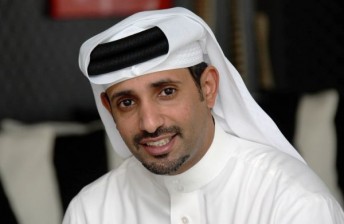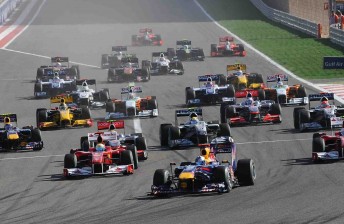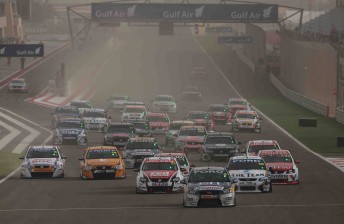

The Kingdom of Bahrain is starting to see the light after a difficult period of political unrest.
Last year, the country’s Formula 1 Grand Prix was cancelled when civil unrest erupted as part of wide spread trouble throughout the region.
Twelve months on, Bahrain is back on track, returning to the F1 calendar, and most importantly, with most of its troubles behind it.
After hosting its first Grand Prix in 2004, the Bahrain International Circuit also has a close tie to V8 Supercars racing, having held a round of the championship on four occasions.
Speedcafe.com’s Grant Rowley spoke to the BIC CEO Shaikh Salman bin Isa Al Khalifa to discuss the circuit’s plans ahead of next month’s Grand Prix and the future of V8 Supercars in the Middle East …
SPEEDCAFE: After missing out on hosting your Formula 1 Grand Prix in 2011, the Bahrain GP returns next month. The talking point has been the political unrest in the country. What is different now, compared to last year?
SALMAN: For us, we’re very excited to have the race back, and the reason for that is that the country has moved on.
The country did go through some unfortunate unrest last year. We actually decided to call off the race because we had more important things to do while the country wasn’t right. We took the decision not to have the race, but the important thing is that, from that, a lot has happened. As a race track, we just sit and monitor all of that. The BICI report (Bahrain Independent Commission of Inquiry), an independent commission that was formed, has worked well. Even the protests, they are properly organised, they are sanctioned, which is good and normal, and there’s structure.
There has been a lot of changes, things have moved on and we’re very confident.
In terms of the support, there has been a large increase. The Grand Prix is really good for Bahrain, and people see that – the economic impact is about US$210 million, so that’s also important. For what we lost back in 2011, it’s important to have that back.

SPEEDCAFE: In terms of pre-sales for foreign guests, has been been difficult to convince them to come to the race?
SALMAN: It has been, (but) the tickets sales we’ve had have been up. For the first 10 days when we started, it was our highest by a large margin, which is not surprising. There’s always been a big interest, especially this year. people see how important it is to bring the race back.
The interesting thing for me is the corporate boxes. Those have almost sold out, which is the first time ever that we’re going to sell out before. There’s a three week cut-off for us, and in our part of the world, it’s a last-minute buying market. It’s good to see that the corporations are showing interest.
Look, there isn’t any travel warnings or advisories from the embassies. All of that means that things are normal.
SPEEDCAFE: Bahrain’s deal to host a Grand Prix expires in 2016. Given that a year was missed, is this year important to ensure that F1 continues to comeback for years to come?
SALMAN: To be fair, Mr (Bernie) Eccelstone and the FIA have been very supportive of having the race in Bahrain. They’ve never … they’ve always trusted us.
If it wasn’t safe, we wouldn’t want people to come here. They respected the decision we took last year. We simply couldn’t have had the race. It wasn’t right.
We’ve been part of the F1 family for quite sometime now, we know a lot of people, and we’ve always hoped to host a race that people like to come to, and that’s what we plan to have this year.

SPEEDCAFE: Your circuit has hosted V8 Supercars in the past, but before I flicked on my recorder, you were saying that it “needs to make more sense” for the circuit for them to return …
SALMAN: That’s right. First off, the V8 Supercars are fantastic. When we chose to have them, the advantage that we had in Bahrain, starting motorsports for the region, is that we look at everything.
We did a full study of all categories in Europe, Asia, America, and I remember it was between the Japanese GT and Australian V8s. That was the final numbers.
One of the greatest pulls was the teams, drivers and the organisations. To me, that’s what made it worked. The drivers are some of the most amazing in all of motorsports. They are down to earth, really close to their fans, and you don’t get that from the USA with NASCAR type racing. That was fantastic and great for us.
The numbers (cost), yeah, it is pretty difficult to have a race that was only in Bahrain. Since Abu Dhabi came on board, we worked with them to try and share the costs. After a while, it became a decision – what we were getting out of it and was there an increase?
That’s why we focused on starting our own Supercar-style racing. We need the feeder. What we realised in that whole exercise is how long it takes to grow that history and foundations. I’m pretty sure V8 Supercars would understand that their category didn’t start in three or four years. It had a long history of racing in the country – there was Peter Brock and Dick Johnson. They had a great head start.
SPEEDCAFE: That’s right – Bathurst will celebrate its 50th year in 2012 …
SALMAN: There you go. We just started or first race in 2004.
It’s really about understanding about growing a motorsport culture, it takes time. We really have to showcase everything, to know what our market is going to like. We would love it to be V8s, because it’s one of the best racing. I remember four cars going down the main straight in Bahrain. I haven’t seen that in any other category we’ve had. No one was releasing, no one was backing off. It’s just fantastic.
SPEEDCAFE: When you have established a richer racing culture, do you see a window of opportunity to bring V8 Supercars back to Bahrain?
SALMAN: We never shut any doors. When you have a relationship with everyone in the category, I wouldn’t leave that out of the equation. We’d love to have them back on day. It just needs time to see how it works.
We have to solve the problem, and it has to be win-win. V8s can’t come all the way to Middle East for one or two races, and there are people who can’t see the point. Other than the money and the great experience, it didn’t make sense. We have to see the benefit.
If we sold out and had crowds wanting it back, which is what Tony (Cochrane) and I discussed, then we’d look at it. But you have to face yourself in the mirror and say “you know what, it wasn’t as we expected it.”
SPEEDCAFE: So you have your own Middle Eastern V8-style series, and as I understand it, a growing interest in karting. What is it going to take for the racing culture to grow as quickly as possible in the Middle East?
SALMAN: I think it’s all about the drivers. Here, you see Lowndes and Whincup and people relate to that. We need to build that side of it – not just the racing.
You need the local names involved, and that’s the side of the equation which is going to take some time. From local karting, to single-seater racing and then getting to the level of Formula 1.
We need to understand our growth cycle. It’s just starting out. Yes, we started out by having certain categories from around the world come and visit us, but we’re in the next phase by trying to grow local talent into motorsports.
We have a karting track that gets about 1600 people every year graduating into the sport. Those who will take the next step, will hopefully mean that in three or four years, we’ll see a return in our investment … when you get people reaching certain levels.
When we have a Mohammed, or Khalid, or a Abdullah racing, then we are more likely to see the local fans come and watch the sport – no matter what category of racing it is. It will come alive after that.

















